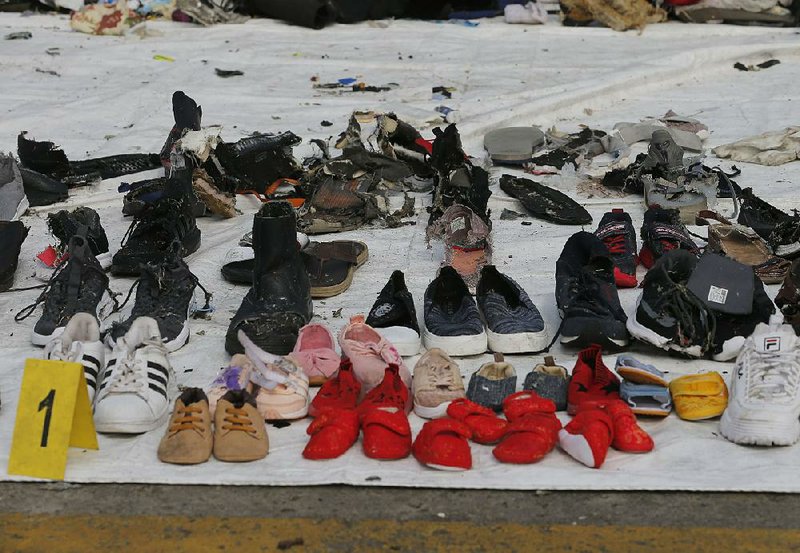JAKARTA, Indonesia -- Search-and-rescue divers working Wednesday in Indonesian waters heard regular "pings" in what authorities said they hope will turn out to be the main body of the Lion Air plane that plunged into the Java Sea shortly after takeoff Monday morning.
Rescuers heard pings from an underwater locator beacon with a distinct sound and interval between them, making it very likely that the wreckage and the location of the flight recorder have been identified, authorities said.
"We hope that [the main wreckage] can be found tonight, including the black box, because the pings were heard," said Muhammad Syaugi, head of the Indonesian national search-and-rescue agency, speaking late Wednesday.
Syaugi said one of the ships using high-tech equipment in the search dispatched a remote-operated vehicle that recorded parts of the aircraft on the seafloor but not the 72-foot-long object detected at a depth of 105 feet that is believed to be the fuselage. He said the area is about 1,300 feet from the coordinates where the airplane lost contact.
Three other objects in separate locations were reached by divers but turned out to be two sunken boats and a fish trap. A remote-operated vehicle was sent to the black box location "but the currents on the seabed were very strong, the [vehicle] was carried away," Syaugi said.
The mission has swelled to almost 1,000 people. Divers were battling strong currents as they scoured the surface of the sea, and had widened the search area, pulling out heaps of debris, including life jackets and clothing.
All 189 people on board are believed to have died in the crash. Finding the main body of the aircraft, including the cockpit voice recorder and the flight data recorder, would be a significant development for investigators, who are working to determine what caused the almost new Boeing jet to crash in good weather about 13 minutes after it took off.
Danang Mandala Prihantoro, a spokesman for Lion Air, said Wednesday that the airline fired its technical director, Muhammad Asif, at the direction of the Transportation Ministry. An interim replacement was appointed to the position.
A team of engineers from Boeing was scheduled to arrive in Jakarta on Wednesday for meetings with Lion Air, according to Indonesia's transportation safety committee.
About 100 divers were searching five areas off the coast of the island of Java, said Didi Hamzar with the national search-and-rescue agency.
Underscoring the intensity of the crash, rescuers have found only parts of victims rather than intact bodies. An identification team had identified only one victim by Wednesday, a 24-year-old student from East Java, based on fingerprints and DNA samples. More than 50 body bags have been sent to a police hospital.
The twin-engine Boeing 737 Max 8 took off from Jakarta's Soekarno-Hatta International Airport for the mining region of Pangkal Pinang early Monday. Just a few minutes into the flight, the pilot asked permission to return to the airport.
Radar showed that the aircraft climbed and descended erratically and that its speed increased dramatically. The flight then lost contact with the control tower.
Officials said it was too soon to identify the cause of the crash, which has puzzled experts. In the context of Indonesia's patchy aviation safety record, however, lawmakers have started to call for a tightening of standards and a government-led audit of the country's airlines.
Indonesian airlines were banned from flying to the United States in 2007 because they were "deficient in one or more areas, such as technical expertise, trained personnel, record-keeping, or inspection procedures," the Federal Aviation Administration said. The agency lifted the ban in 2016.The European Union similarly barred Indonesian carriers from flying into European airspace from 2007 until June.
Information for this article was contributed by Ainur Rohmah of The Washington Post; and by Niniek Karmini, Stephen Wright and Andi Jatmiko of The Associated Press.
A Section on 11/01/2018
